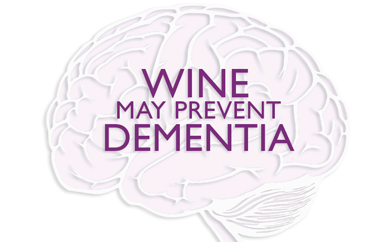WINE MAY PREVENT DEMENTIA
 by HARVEY FINKEL, MD
by HARVEY FINKEL, MD
DEMENTIA has become an enormous worldwide burden: medical, economic, personal. Many of those afflicted would still be in their productive years. No resolution is in sight. We are avid for anything that might reduce the toll.
Dementia is a progressive brain dysfunction chiefly attacking memory and cognition. The vast majority of cases are either Alzheimer’s disease, (6O-7O percent,) characterized by the deposition in the brain of an abnormal proteinaceous material, amyloid beta, or vascular dementia; (25 percent,) caused by multiple, often otherwise inapparent, atherosclerotic strokes, by which brain tissue is deprived of adequate blood supply, much like ischemic heart disease. A number of other causes account for the rest, including drinking far too much for too long, especially when complicated by malnutrition or repeated head trauma.
But today we are focusing on the flip side of the coin. We have seen during the last 3O years the wisdom of sages of old confirmed: moderate drinking reduces the risks of atherosclerotic heart attacks, strokes, and other complications of arterial disease, reduces the risk and severity of diabetes, and decreases death rates. Might drinking in moderation be helpful in controlling dementia?
A number of epidemiological studies have strongly suggested this to be so. Now comes a large and well-done meta-analysis from Ocean and Qingdao universities in Qingdao, China, reported by Yu, Wang, Wan, et al. in the EUROPEAN JOURNAL OF EPIDEMIOLOGY.
The investigators analyzed eleven studies of 73,33O subjects with 4586 cases of dementia from all causes; five studies of 52,715 subjects including 1267 cases of Alzheimer’s disease; and four studies of 49,535 subjects with 542 cases of vascular dementia. They found a J-shaped curve, that is, light-to-moderate drinkers were at substantially lower risk of falling prey to dementia than were abstainers on one side or heavy drinkers on the other. One might explain this off hand by invoking the well-known vascular benefits of moderate drinking, but the risk reduction held true for the all-cause dementia groups and the Alzheimer groups, as well as the vascular groups, indicating something more was going on. What that is is not known now.
Spicing the stew, it appears that the benefits are limited to consumers of wine, among beverage types, and may be greater in wine drinkers under 6O years of age than in those older. Maximum benefit was seen among subjects whose average wine consumption was about 2-4 ounces per day. Their risk of dementia was found to be 42 percent lower than that of non-drinkers. Risk begins to rise above baseline (abstainers’ risk) when consumption exceeds about 13 ounces per day. The color of wine and other details of drinking patterns were not addressed, but should be in future studies.
That only wine among alcoholic beverages is associated with lowering of dementia risk suggests that it would not be the alcohol operating. Discussions among members of the International Scientific Forum on Alcohol Research (www.alcoholresearchforum.org/critique-197) focused on the phenolics of wine, including resveratrol, gallic acid, and quercetin. Speculations included the possible beneficial activities of these compounds on oxidation, inflammation, fats, clotting, atherosclerosis, or amyloid beta. Enlightenment awaits more research.

